Let our team help you navigate the ever-changing benefits compliance landscape each month. Check out this month’s latest alerts, additional updates, and resources – hot off the press:
Employee Benefits Compliance Alerts
Court Decision May Impact Preventive Services
- In March 2023, a Texas District Court issued an opinion in the Affordable Care Act (ACA) preventive services case Braidwood Mgmt. Inc. v. Becerra (Braidwood).
- The case challenges the Constitutionality of the ACA preventive services mandate.
- The court vacated ACA preventive services recommended by the United States Preventive Services Task Force (USPSTF) issued after March 23, 2010.
- The Department of Justice filed both a notice of the decision to appeal and a motion to stay soon after the decision.
- On April 13, 2023, the Departments released clarifying guidance to promote compliance with preventive service requirements while the case is pending.
OCR Proposed Privacy Rule for Reproductive Health
- On April 12, 2023, the Office of Civil Rights (OCR), a division of the Department of Health and Human Services (HHS), issued a Notice of Proposed Rulemaking (NPRM) that would amend the Health Insurance Portability and Accountability Act (HIPAA) Privacy Rule regarding the disclosure of reproductive healthcare personal health information (PHI).
- The proposed rule creates a new definition for the term “reproductive healthcare.”
- The proposed rule prohibits a covered entity or business associate from using or disclosing PHI for certain “non-healthcare purposes.”
- The proposed rule creates a new attestation process and updates the current HIPAA notice of privacy practices.
Correcting Excess HSA Contributions
- The Internal Revenue Service (IRS) sets the maximum annual health savings account (HSA) contribution each year.
- Contributing more than an individual HSA account holder is eligible for is known as an excess HSA contribution and must be corrected to avoid taxes and penalties.
- There are two primary ways to correct an excess HSA contribution.
Another Change to the Outbreak Period End Date
- On January 31, 2023, President Biden announced the end of the National Emergency (NE) and the Public Health Emergency (PHE).
- On March 27, 2023, the Departments released a set of frequently asked questions (FAQs) clarifying many issues surrounding the end of the NE and PHE.
- On April 10, 2023, President Biden signed a Congressional Resolution ending the NE immediately.
- The Department of Labor (DOL) informally made comments that the Outbreak Period would still end on July 10, 2023.

Additional Updates & Resources
Reminder! RxDC Reporting Due June 1
The next round of required Prescription Drug Data Collection (RxDC) report is due June 1, 2023. Plan sponsors must report specific healthcare and prescription drug spending information to the Centers for Medicare and Medicaid Services (CMS) with the intent that the collected information will help reduce healthcare and prescription spending costs in the future. CMS has released interim final rules (IFR) instructions and frequently asked questions (FAQs) to assist health plan sponsors and reporting entities with compliance. For more information, review our previous EPIC Insights articles on reporting obligations, employer obligations, and updates to published guidance, and watch our client webinar.
CMS Finalizes 2024 Notice of Benefit Payment Parameters
On April 17, 2023, the Department of Health and Human Services (HHS) through the Centers for Medicare and Medicaid Services (CMS) released the final Notice of Benefit Payment Parameters (NBPP), determining annual adjustments to cost-sharing under the Affordable Care Act (ACA). The proposed cost-sharing limits for plan years starting in 2024 are $9,450 for self-only coverage and $18,900 for other than self-only coverage, which is a 3.8% increase from the 2023 limits of $9,100 and $18,200, respectively. These limits are higher than Internal Revenue Service (IRS) out-of-pocket maximum limits for high deductible health plans (HDHPs) that will be released sometime this spring.
Washington Cares Act Payroll Deductions Start July 1
The Washington Cares Act (WCA) establishes a program that provides individuals in the state of Washington access to long-term care coverage through a state fund. The program is completely funded by employee payroll deductions. Employees contribute 0.58% of income, or employees can purchase their own private long-term care policy and apply for an exemption from the state program and deduction. The payroll deduction was originally set to begin in 2022 but was delayed until July 1, 2023. Employers should take steps to begin payroll withholding and remind employees that withholding begins in July.
Visit our Compliance page and see how our EPIC team can help your business thrive!
